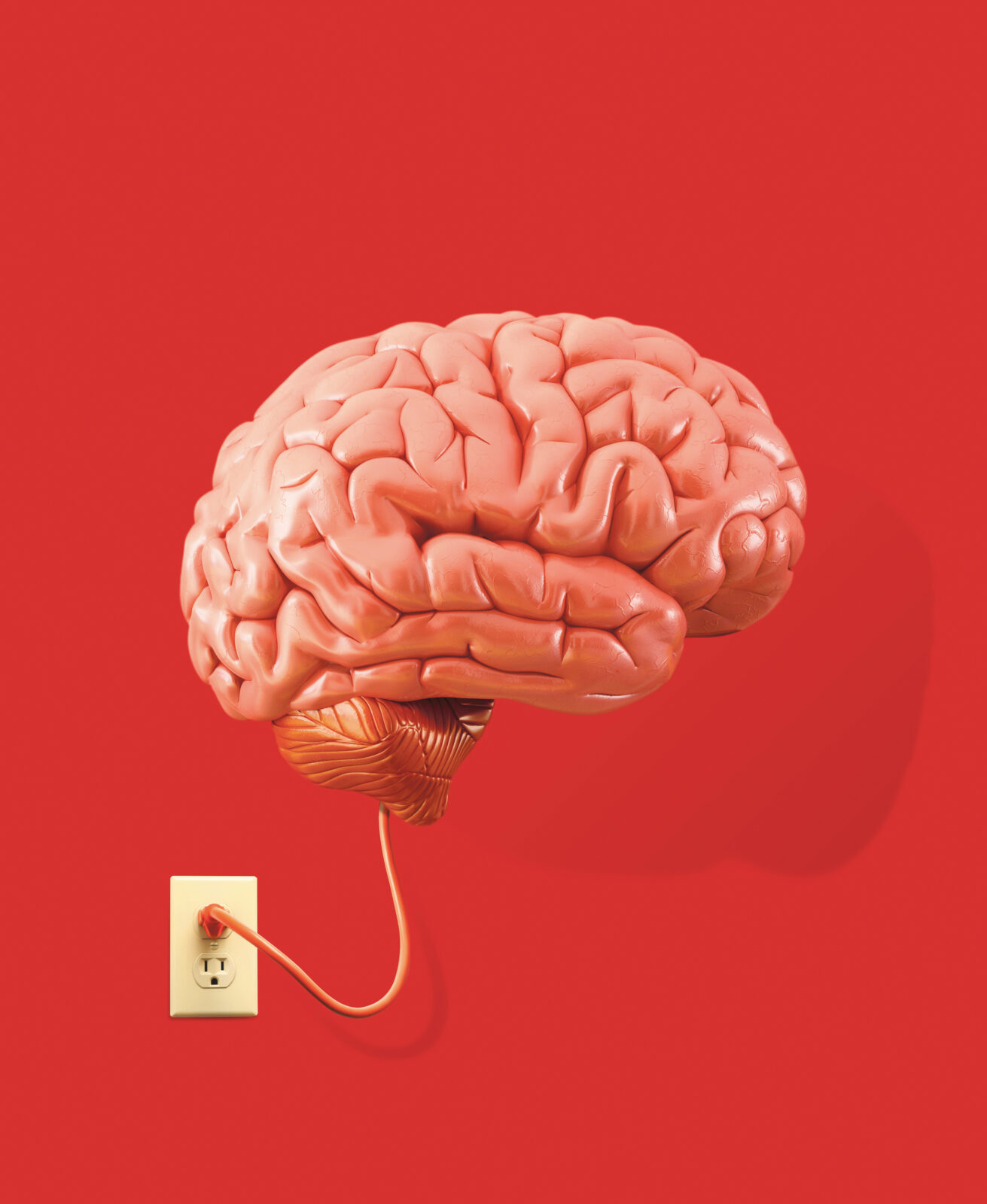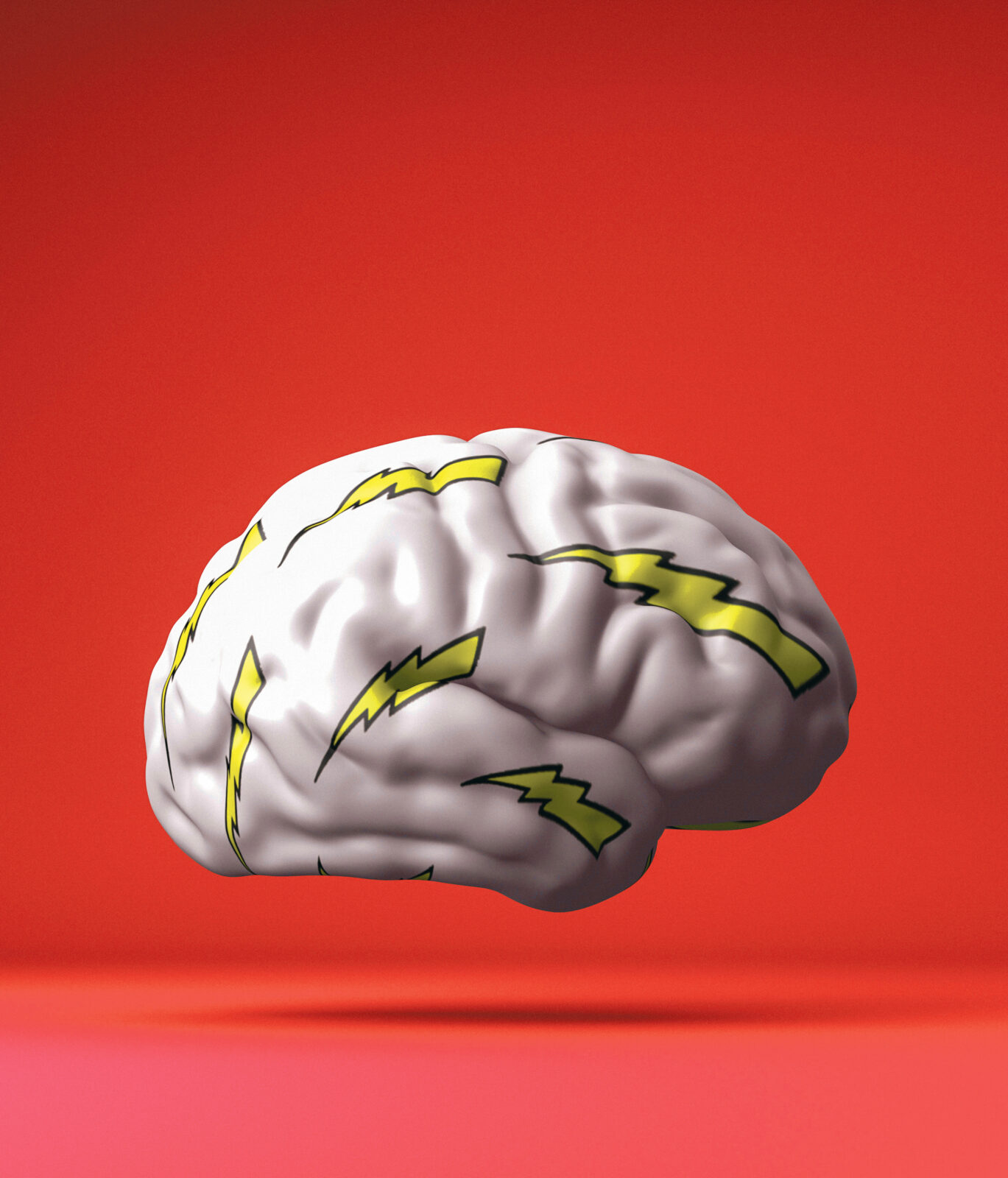
Illustration by Delcan & Company

Illustration by Delcan & Company
Professor Sukhvinder Obhi: One of the things we studied for quite a few years is the phenomena of non-conscious mimicry, the tendency to copy what other people are doing in a social interaction. It led us to the mirror system and a process called mirroring, which involves the activation of structures in the brain of someone who is observing another person’s actions. It’s called mirroring because the activated structures overlap with the motor structures that would be active if the observer was performing the action themselves. We were researching the potential link between this kind of mirroring and the behavioral manifestation of non-conscious mimicry. In essence, we were wondering if non-conscious mimicry might be implemented by mirroring in the brain, as both phenomena involve taking an input from another person and then activating motor structures. Strangely, this line of research inquiry led us to power.
As we were doing our research, we looked at the kinds of variables that are known to affect non-conscious mimicry and saw whether those same variables affected mirroring in the brain. For example, social psychologists have found that when you feel independent you mimic other people less. When you feel socially connected you mimic other people more. We wondered whether making someone feel interdependent would be associated with more of this motor activity in the brain—that is, mirroring—when they are watching somebody else. If they’re feeling independent, we should see less of it. That’s exactly what we found. That then became an approach that we started using to explore the idea that the mirror system might underlie social mimicry.
This is where we get to power. Social psychologists had also looked at the effects of power on mimicry, and they found that when you get two people interacting who differ in the level of power that they hold, the pattern of mimicry is quite interesting. When I’m feeling powerful I don’t mimic someone who is less powerful very much. But when I’m feeling powerless I mimic a powerful person quite a bit. There’s asymmetry in the degree of mimicry that people show when they are in a power-laden dynamic. We decided to do the obvious experiment of assessing mirroring in the brain of people feeling powerful or powerless.
We use a neuroscientific technique called Transcranial Magnetic Simulation (TMS) to get a momentary readout on the excitability levels of the motor cortex in the human brain. We gathered a group and primed some of our participants to feel really powerful using a standard technique that involves them thinking about a time when they had control over other people. We asked a second group to think about a time when they felt powerless. We had another group as a control condition where they just wrote down what they did yesterday.
We measured mirroring response in the motor cortex using this TMS technique while they watched a fairly benign action, for instance squeezing a rubber ball. Remarkably, we found that the powerful people weren’t really mirroring. The motor cortical activity in the power holders was low. Whereas with the powerless people, their motor cortex was quite active. It was consistent with what the social psychologists had found in behavior. That helped us understand further how social mimicry might unfold.

Illustration by Delcan & Company
We became very interested in the idea that power is this ubiquitous social force. If you want to understand social behavior, you can’t really understand it without thinking about power, because power permeates virtually all interactions in the social world. I often use a Bertrand Russell quote: “The fundamental concept in social science is Power, in the same sense in which Energy is the fundamental concept in physics.” Russell’s perspective is insightful.
From a cognitive neuroscience perspective, power has been understudied, but it’s very likely that power affects multiple brain systems. In terms of what we’ve studied, there are a couple of interesting brain systems that we think are linked to different power states. One of these systems is called the behavioral activation system. It is about our propensity to get up and do something, to act. The other is the behavioral inhibition system. It is involved in inhibiting behavior and avoidance of threat.
In our research we’ve found that feeling powerless is associated with less activity in the behavioral activation system, which reflects lower approach orientation. Conversely, powerful people show more of this left frontal brain activity. In fact, neutral people show quite a bit of this left frontal activity as well. The difference seems to come from the low-power people. When you are feeling particularly low power, your brain seems to change in a way where you’re engaging the behavioral activation system less. This pattern of brain activity could explain why low-power people might display more tentativeness and be less prone to just getting up and acting in a situation. Of course, this affects how people might access opportunities in the world.
Power is a complex thing. Power can be related to your position in a hierarchy. The higher up you are, the more power you have. But that view of power can give you the impression that power can be a bit rigid. Actually, power is very dynamic. If you look at the workplace and think about a person who is a middle manager, they live half their lives looking up and the other half looking down. Their relative power in any given situation could be high or low. They can be in a meeting with their boss where they are the least powerful person, and then walk into another room where they have their team and now they are the most powerful person.
On a timescale of potentially just minutes your relative power can go up or down. So power is dynamic, and what the research would suggest is that yes, priming somebody to feel more or less powerful can reconfigure the way the brain is processing the social world. That said, there are personality traits, for example narcissism, that are sometimes present in powerful individuals, and these may be more enduring.
We haven’t got a chance of understanding social behavior unless we can understand what power is doing, and to do this we have to understand what’s going on in the brain. We know to some extent how the brain processes the social world, so knowing how these brain processes change when somebody is in a state of high or low power is critical to us understanding at a deeper level the forces that shape social interactions.
Once you have a sense of what’s happening in the brain, it gives you a much more holistic understanding of the phenomenon. That can then lead to the development of strategies or ways to advise people in a more enlightened way. You can advise people on how they can potentially harness the positive effects of power and mitigate some of the negatives. Such advice is bolstered by an understanding not just of behavior but of the brain processes that underlie the behavior.
POWER IS JUST YOUR ABILITY TO INFLUENCE THE STATES OF OTHER PEOPLE. THE GOOD OR BAD OUTCOMES YIELD FROM HOW YOU USE IT.
Powerless people show less left frontal alpha asymmetry, which means they show less cortical activity in the left frontal parts of the brain compared to high power individuals who show more of it. It’s important because when you have more left frontal activity you’re in more of an activation state. You’re more likely to engage in actions and engage in the world with opportunities and things around you. When you’re powerless and you don’t show this activation, it’s associated with less of this tendency. We can link that to the real world. Now this is a speculative jump because we haven’t done these experiments, but if we know that’s what is happening in the brain, one thing we can do is to figure out strategies for low power individuals to overcome tentativeness. The behavioral activation system is not as active, not as engaged, which suggests they are holding back. Once you know that you can figure out what we can do to help low power individuals. How can we advise them? How can we set up social scenarios or social environments that would increase their chances of engaging? Can we overcome that difference in the brain activity? My suggestion would be yes, because there are other things we could tell them that could modulate that basic pattern of activity.
I consider power to be not good or bad. Power is just your ability to influence the states of other people. The good or bad outcomes yield from how you use it. A lot of the research on power looks at what I call the default effects of power. You make someone feel powerful and then you look at what it does to their behavior. If you look at the social psychology of this, you see when someone feels powerful they become worse at taking the perspective of other people. When I’m not taking your perspective, it means I’m not taking you into account, which means I’m more likely to act in a way that damages you. We also see that powerful people are more likely to engage in any kind of action in any situation, regardless if the action is appropriate or not. That means you’re more impulsive.
All of these are default effects of power. On average when you test a group of people, these effects just happen when you make them feel powerful. I would guess that many of the negative effects of what I call everyday power—the kinds of dynamics that play out in the workplace or family life—are happening because we are not aware of how power is affecting the way we’re doing things. We’re not aware that the power that we feel is making us worse at perspective-taking and perhaps less empathic. We’re not aware of the fact that power might be making us more impulsive.
The first step is to create an awareness of what power can do and then coach people in using power more mindfully. Power is not good or bad—it’s how you use it. Once you know that the default effects of power can produce negative tendencies, then it puts you in the driver’s seat to mindfully avoid them.
I’m a great believer in mindfulness. We evolved a really sophisticated prefrontal cortex that allows us to engage in very complex reflective thought as human beings. It relates to our unrivaled ability to think in complex ways and to reflect on our own behavior and engage in what you might call mindfulness, an awareness of how we are. I think that is a very powerful tool to start guiding people in how to not fall prey to some of the potential pitfalls of power. It’s fundamentally about what you pay attention to. Of course, we can’t introspect on every brain process, as we just don’t have conscious access to everything that’s going on in our head. Crucially though, we can attend to and reflect on some aspects of our thought and behavior, and this may be very helpful.
Realizing that power can sometimes by default create negative tendencies is the first step in mitigating it. Once you know you’re doing something that might damage somebody then you’ve got a shot at not doing it. It’s as simple as that. If you think about the workplace, the boss may not realize that the way they’re acting or perceiving people is contributing to the problem just by virtue of the fact that it’s not on their radar.
It’s very much about awareness. The research that we’re doing and that others are doing is showing what power can do to the brain and behavior, and the first step is just to appreciate that. Sit back and say, “Wow, I didn’t know that if I feel powerful I’m more likely to interrupt people.” Something like that may seem like it’s pretty benign; it’s a small thing. But if you think about powerful people interrupting people day in day out all the time, and then you think about the cumulative effects on those other people you can see how that can create negative social interactions.
The first question to ask would be: How are you using the influence you have over others? If you understand what power is doing to you, you are understanding yourself and can potentially mitigate some of the negatives and harness some of the positives. One of the positives is that power makes you more goal-directed and more likely to act. Take advantage of that and focus on goals that are conducive to positive incomes. My thesis is that a powerful person will be more effective when they are engaged in behavior that has positive outcomes for other people.

Professor Sukhvinder Obhi is the director and principal investigator of the Social Brain Body and Action Lab at McMaster University, Canada. He completed his PhD in cognitive neuroscience at University College London. Professor Obhi is internationally known for his research on power and the brain and has published over 75 articles and authored multiple books. He is actively engaged in knowledge mobilization outside of the academy, and to that end, he consults with a range of organizations on the topics of power and leadership in a complex social world.

Howard Kaplan is an editor and writer who helped found Spiral magazine in 2017. He currently works at the Smithsonian and divides his time between Washington, DC, and New York City.
Get the latest news and stories from the Rubin, plus occasional information on how to support our work.